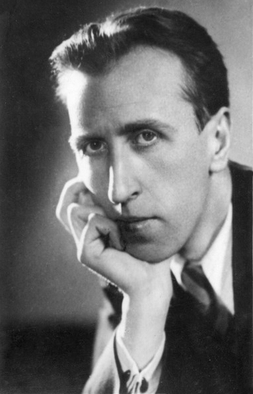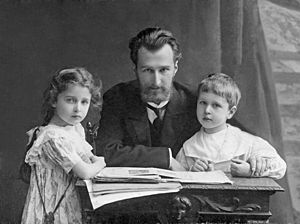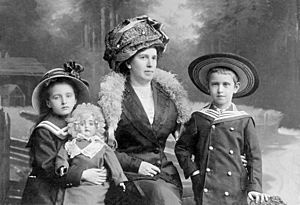Dmitry Kabalevsky facts for kids
Dmitry Borisovich Kabalevsky (Russian: Дми́трий Бори́сович Кабале́вский ; 30 December [O.S. 17 December] 1904 – 14 February 1987) was a famous Soviet composer, conductor, pianist, and teacher. He was from Russia.
He helped start the Union of Soviet Composers in Moscow. He stayed an important leader there for his whole life. Kabalevsky wrote a lot of music for the piano and for small groups of instruments (chamber music). Many of his piano pieces were played by the famous pianist Vladimir Horowitz. People in Western Europe often know him for his Second Symphony. They also know the "Comedians' Galop" from his The Comedians Suite, Op. 26, and his Third Piano Concerto.
Contents
Early Life and Education
Dmitry Kabalevsky was born in Saint Petersburg, Russia, in 1904. When he was young, his family moved to Moscow. His father was a mathematician and wanted Dmitry to study math. But Dmitry loved the arts from a young age.
He studied music at the Academic Music College in Moscow. He finished there in 1922. Then, he kept studying with Vasily Selivanov. In 1925, he went to the Moscow Conservatory. There, he learned how to compose music from Nikolai Myaskovsky. He also studied piano with Alexander Goldenweiser. By the time he was 26, he had already written many pieces. These included a String Quartet, his first Piano Concerto, and songs for children.
Composer and Teacher
Kabalevsky became a senior lecturer at the Moscow Conservatory in 1932. By 1939, he was a full professor. He also worked as a music critic for the radio. He was an editor for a music magazine and a music publisher.
Kabalevsky wrote many different kinds of music. He composed symphonies, concertos, operas, ballets, and songs. He also wrote music for plays and movies. Some of his movie music became famous on its own.
His biggest gift to the world of music was his work with children. In 1925–26, he taught piano at a government school. He noticed there wasn't much good music for children to learn. So, he decided to write easy pieces. These pieces helped children learn how to play instruments. They also helped them develop good musical taste. He wanted to connect children's playing skills with the beauty of adult music. He even wrote a book about it called Music and Education: A Composer Writes about Musical Education.
Public Life and Recognition
Kabalevsky joined the Communist Party in 1940. The Soviet government gave him the Medal of Honour in 1941 for his musical talent. He was a traditional composer. He also believed strongly in helping his country through his educational work. This made the Soviet government like him. He received many awards, including the Lenin Prize in 1972. He also received the Hero of Socialist Labour in 1974. This shows he could create great music even when other composers faced difficulties.
Kabalevsky's music often used traditional harmonies. He liked clear, simple melodies with some colorful notes. He often used common musical forms like rondo or variation structures.
Unlike some other composers, Kabalevsky supported the ideas of socialist realism. This was an art style that promoted Soviet ideals. His later works were seen as "popular and successful." Some of his most famous pieces for young people came from this time. These include his Violin Concerto and his First Cello Concerto. Kabalevsky wrote music for all types of musical groups. He always stayed true to the ideas of socialist realism.
Kabalevsky traveled a lot to other countries. He was part of the Soviet Peace Committee. He also worked to promote friendship between the Soviet Union and other nations.
In 1961, Kabalevsky conducted a recording of his own music. This included his Overture Pathetique and Songs of Morning. This recording was released in the U.S. in 1975. Also in 1961, he arranged Franz Schubert's famous Fantasia in F minor for piano and orchestra. This piece was originally for two pianists playing one piano. Kabalevsky made it a challenging piece for a solo pianist with a full orchestra.
He received many state awards for his music. For his teaching, he became the head of the Commission of Musical Aesthetic Education of Children in 1962. In 1969, he became president of the Scientific Council of Educational Aesthetics. He also received an honorary degree as president of the International Society of Musical Education.
One of his notable students was Leo Smit.
Dmitry Kabalevsky passed away in Moscow on February 14, 1987.
Legacy and Music Education
Kabalevsky greatly developed and promoted a special system for music education. This system included thousands of state-supported music schools for children. These schools taught classical music to many students. After an 8-year course, most students became good listeners and lovers of classical music. They did not always become professional musicians. The next step was music schools that trained teachers for these children's schools. Finally, conservatories trained world-class performers.
Classical music performers were very well-known in the Soviet Union. They were often on TV, just like ballet dancers. Kabalevsky had a famous saying: "Beauty Evokes Kindness" (Russian: Прекрасное пробуждает доброе). This showed his belief in the power of music.
After the Soviet Union ended, the music education system changed. By 2015, over 3,000 children's music and arts schools still existed in Russia.
Honours and Awards
- People's Artist of the RSFSR (1954)
- People's Artist of the USSR (1963)
- Hero of Socialist Labour (1974)
- Four Orders of Lenin (1964, 1971, 1974, 1984)
- Order of the Red Banner of Labour (1966)
- Order of the Badge of Honour (1940)
- Lenin Prize (1972) – for a new version of his opera "Colas Breugnon" (1968)
- Stalin Prizes
- first class (1946) – for his String Quartet No. 2 in G minor Op. 44 (1945)
- second class (1949) – for his Concerto for Violin and Orchestra (1948)
- second class – for his opera "Taras Family" (1950)
- USSR State Prize (1980) – for his 4th Concerto for Piano and Orchestra ("Prague") (1979)
- Glinka State Prize of the RSFSR (1966) – for "Requiem" for soloists, two choirs and orchestra (1962)
- Lenin Komsomol Prize (1984)
Selected Filmography
- A Petersburg Night (1934)
- Aerograd (1935)
- Dawn of Paris (1936)
- Shchors (1939)
- Anton Ivanovich Is Angry (1941)
- First-Year Student (1948)
- Ivan Pavlov (1949)
- Mussorgsky (1950)
- Hostile Whirlwinds (1953)
- The Sisters (1957)
Works
- To see a full list of his musical pieces, visit List of compositions by Dmitry Kabalevsky.
See also
 In Spanish: Dmitri Kabalevski para niños
In Spanish: Dmitri Kabalevski para niños
 | Selma Burke |
 | Pauline Powell Burns |
 | Frederick J. Brown |
 | Robert Blackburn |




